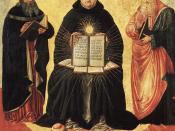The basic question behind religious language debate is ÃÂwhat can be said about God?ÃÂ The religious language debate is not concerned with whether or not God exists, or what God is like or why there is evil in the world. It is solely concerned with working out whether or not religious language means anything. Within the debate, old tradition of religious believers argue that you can speak and write about God, because God is a reality. Nevertheless Logical Positivists claim that statements about God have no meaning because they donÃÂt relate to anything that is real? In the debate about religious language, there are two types of language, cognitive and non-cognitive. Cognitive language conveys facts i.e. things that we can know. Non-cognitive language, predictably, conveys information that is not factual; emotions, feelings and metaphysical claims.
In the 1920's in Vienna a group of philosophers, known as the Vienna Circle, proposed a theory to do with logic and language.
Influenced by the ideas of Wittgenstein, the group proposed a way in which it could be decided what it was meaningful to say, and what was pure nonsense. This view also became known as Logical Positivism. They concluded words had to be justified either through empirical evidence or through logic following empirical evidence. Therefore to verify any word, one had to establish its worth. For example the word ÃÂtableÃÂ is easy to verify because we can see and touch the table. ÃÂTwo plus two equals fourÃÂ is a logical and therefore a meaningful statement, if we do not try to specify what two is. ÃÂGod is LoveÃÂ, is meaningless because we can find no verification of ÃÂGodÃÂ nor ÃÂLoveÃÂ. Beliefs are not based upon any thing verifiable as philosophers had tried to create logical ontological, cosmological and teleological arguments for the existence...


